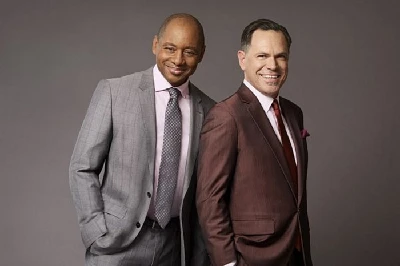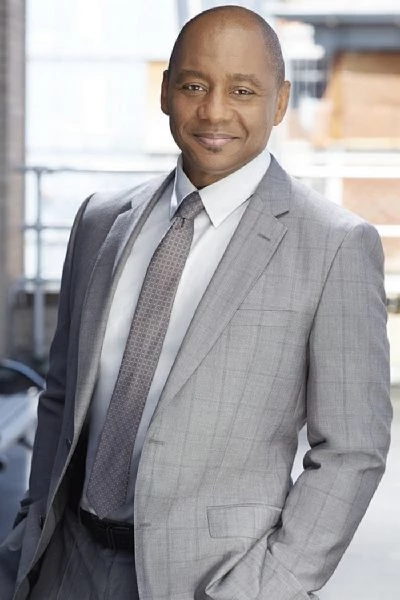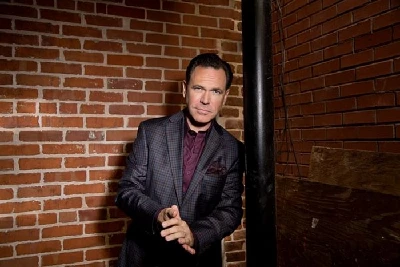published: 8 /
2 /
2017

Lisa Torem watches from the balcony as the Branford Marsalis Quartet and Kurt Elling join forces for an exciting night at the Chicago Symphony Center
Article
Kurt Elling’s got guts. Why else would he perform songs from last year’s ‘Upward Spiral’ with the Branford Marsalis Quartet on the Chicago Symphony Center Stage? Obviously it’s an honour - Marsalis has the right to be choosy about his vocalists, but it’s also the ultimate jazz vocalist challenge. After all, Elling is in command of his own creative ship when touring with pianist Laurence Osgood internationally and is one of America’s most admired jazz vocalists in his own right, but working with Marsalis, by some accounts, puts this artist way outside the zone.
So perhaps that was part of the allure last night. Two luminaries that work extremely well on their own - how would they fare together? The intimate, elegant room was packed. There was an intensity about the audience. There were kids, seniors and couples. The VIP section was seated onstage. When Branford Marsalis and his players stepped onstage to warm things up, they, along with the upper and lower balcony patrons, roared.
Kurt Elling is known for his Sinatra-like baritone, rhythmic fluency and easy-going personality. Early in his career, he released six albums on the Blue Note Label. He has been nominated for the Grammy Awards, ten times. His crooning, scatting, spoken word and patter led to a Grammy for Best Vocal Jazz Album, ‘Dedicated to You: Kurt Elling Sings the Music of Coltrane and Hartman’ (Concord, 2009).
He, like Marsalis, is very particular about performance material. Both acts, independently, delight in surprising their fans; keeping them on pins and needles as each phrase magically melts into the next.
The room, fortunately, has great sight lines, so it was easy to hunker down and witness the flurry of activity. The Branford Marsalis Quartet consists of pianist Joey Calderazzo; bassist Eric Revis, drummer Justin Faulkner and, of course, Berklee College alum and New Orleans native Branford Marsalis, who comes from a large, musical family.
They swung the set open with ‘There’s A Boat Dat’s Leavin’ Soon for New York’ (G. Gershwin, I. Gershwin, Edwin Du Bose Hayward) from the American musical ‘Porgy and Bess’. Elling swung into cool action, sliding from octave to octave, surveying all sides of the room.
The quartet turned this conventional blues number into a heady jamboree, seamlessly trading exuberant licks before granting Ellis the right-of-way. He’d already bonded, having heartily greeted, what would have been his hometown audience—he had entertained sold-out houses at Chicago’s Green Mill Tavern at the start of his career in the 1990’s - before setting down roots in New York City.
The next track from ‘Upward Spiral’ that they performed was ‘Blue Gardenia.’ Marsalis gingerly phrased the transitional passages. Elling showed admirable restraint, too, allowing the essence of each verse to gradually blossom.
Ironically, Elling drew much more emotional depth from ‘Practical Arrangement’ (Sting/Robert Methes.) This bittersweet ballad told from the viewpoint of a perseverant, but insecure lover, requires the utmost subtlety to pull off sincerely, and Elling sharply delivered. The Quartet’s sophisticated comping and virtuosity reinforced the dramatic narrative. Marsalis, especially, echoed the thematic vulnerability with silky/sonorous and biting, atonal touches. Faulkner’s drum solo was clean and demonstrative.
Calderazzo also shone; his airy voicings and delicate, classical runs heightened the dramatic arch. In contrast, his original co-write, ‘The Return (Upward Spiral)’ needed an alternative jolt. This one’s a song full of promise and optimistic prose. Marsalis took this opportunity to bring out his lilting soprano sax; his tone quality added even more embrace to this uplifting signature song. And when Calderazzo weighed in with a monster solo, he performed with body and soul, bringing to mind George Shearing and Oscar Peterson.
Other highlights included Elling’s poised command of Portuguese on ‘So Tinha de Ser Com Voce’ (Antonio Jobim and Aloysio de Oliveira) and ‘Mama Said’, based on a poem by Calvin Forbes, with original music composed by Marsalis. It was no small feat to recite lines such as, “The memory by itself is delicious / Each bite was a small miracle…”
The encore consisted of ‘I’m A Fool to Want You,’ in which Marsalis and Elling performed as a duo, and where Revis took command of the stage with his forceful, upright bass. He teased the audience with several false stops and showed off his dexterity and natural ear.
The final song, ‘St. James Infirmary’ was made famous by American trumpeter Louis Armstrong in 1928. This twelve-bar blues, which allows for extended, improvisational freedom, left eons of room for creativity and just plain fun. Whilst Elling played faux trumpet, the Quartet dialed up more sonic dynamite. Still, I left hoping Elling would sing just a few more bars before the house lights were turned back on…
That said, this possibly intrepid pairing turned out to be quite a success. Some of the audience didn’t realize that they were indeed two separate acts that had come together specifically for this special project; the chemistry was that strong.
Branford Marsalis states on his website, “This is the kind of music that should expand our base to include people who would like jazz if it were friendlier.” I’d say they nailed it.
Band Links:-
http://www.branfordmarsalis.com/
https://www.facebook.com/branfordmarsa
https://twitter.com/bmarsalis
http://kurtelling.com/
https://www.facebook.com/kurtelling
Picture Gallery:-

